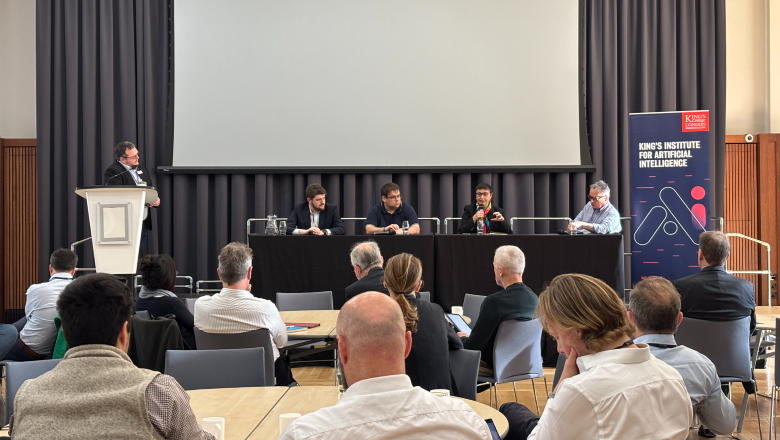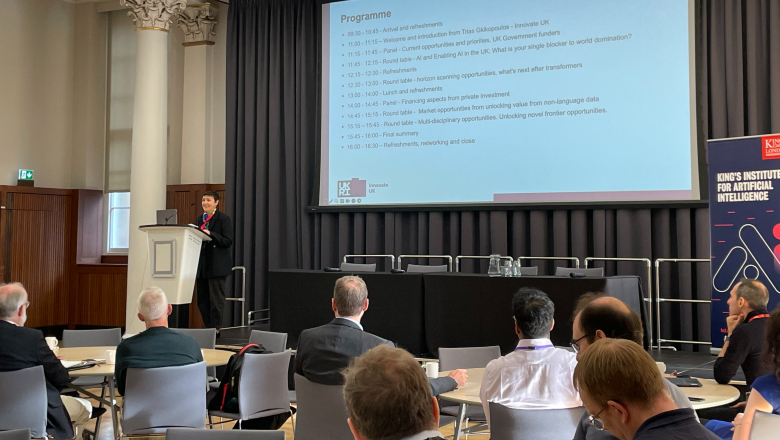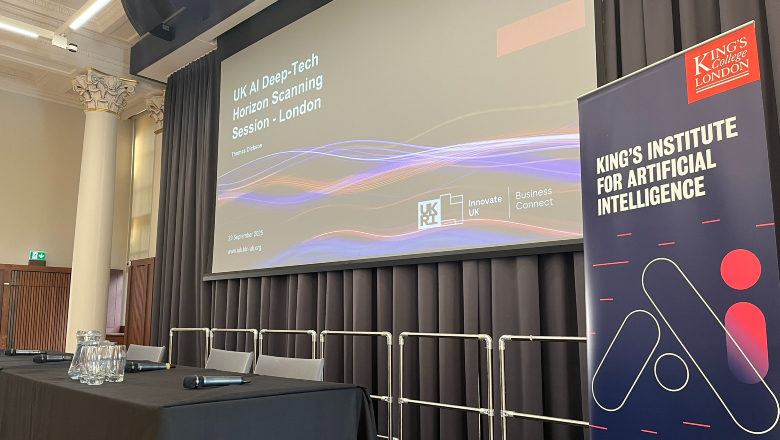As a Faculty, we are particularly proud of our sustained collaboration with Innovate UK, and welcomed the opportunity to support their mission to advance sovereign AI capability—a critical area for ensuring both national resilience and international competitiveness.
Catherine Tate, Senior Enterprise Development Manager, Faculty of Natural, Mathematical & Engineering Sciences
30 September 2025
King's hosts dialogue on the UK's deep-tech AI sector
The cross-sector discussion focused on maintaining UK leadership in frontier AI.

The King’s Institute for Artificial Intelligence and the Faculty of Natural, Mathematical & Engineering Sciences hosted a UK AI Deep-Tech Horizon Scanning Session on Monday 29 September 2025. Organised by Innovate UK, this event connected higher education, industry, investment, and policy voices for a day of dialogue and collaborative exploration to identify how the UK can remain globally competitive in next-generation AI infrastructure and applications. The London session was preceded by sessions earlier in September in both Oxford and Cambridge.
The event’s opening address was delivered by Professor Elena Simperl, Co-Director of the King’s Institute for Artificial Intelligence.
"AI at King’s isn’t just defined by the Department of Informatics. It spans every faculty and area of the university. This multidisciplinary approach is the only way for us to tackle AI’s most pressing challenges.
At a time when the AI ecosystem as a whole is becoming less transparent as major advances in AI are increasingly coming from the private sector, universities have an important role in upholding the transparency and safety of AI research and developments, contributing open knowledge, and ensuring rigorous training of the next generation of AI experts."

The first panel explored how the relationship between private investment, business and academia can unlock frontier AI in the UK. Panellists stressed the importance of strong, proven concepts, robust intellectual property (IP) protection, and solid business plans. Universities remain critical for supporting knowledge transfer, safeguarding intellectual property, and sharing expertise within the AI ecosystem.
Universities have an important role in upholding the transparency and safety of AI research and developments, contributing open knowledge, and ensuring rigorous training of the next generation of AI experts.
Professor Elena Simperl
Moving from a focus on the private to the public sector, the second panel provided attendees with an insight into current opportunities and priorities from government funders, with representatives from the Advanced Research + Invention Agency (ARIA), Innovate UK and Digital Catapult. The discussion centred on programmes that enable AI-driven innovation in infrastructure domains such as supply chains and transportation, as well as the development of hardware and computational frameworks.
The day also consisted of a series of round tables to identify blockers to enabling AI in the UK, highlight market opportunities from unlocking value from non-language data, and outline multidisciplinary opportunities for unlocking novel frontier opportunities. The contributions will help shape Innovate UK’s approach to the UK’s deep-tech AI ecosystem.
"The Faculty of Natural, Mathematical and Engineering Sciences at King’s has established a strong reputation for convening opportunities for academia, industry, government, and arms-length bodies to engage in structured dialogue on research priorities—both those shaping the present and those rapidly emerging on the horizon.
These vibrant events serve two purposes: to act as catalysts for partnerships that enable researchers to translate theoretical advances into practical applications, and to drive knowledge exchange while ensuring alignment with sectoral priorities.
As a Faculty, we are particularly proud of our sustained collaboration with Innovate UK, and welcomed the opportunity to support their mission to advance sovereign AI capability—a critical area for ensuring both national resilience and international competitiveness."



